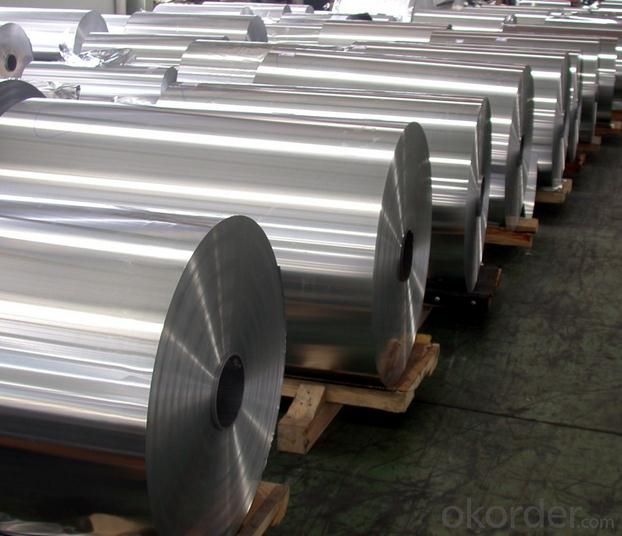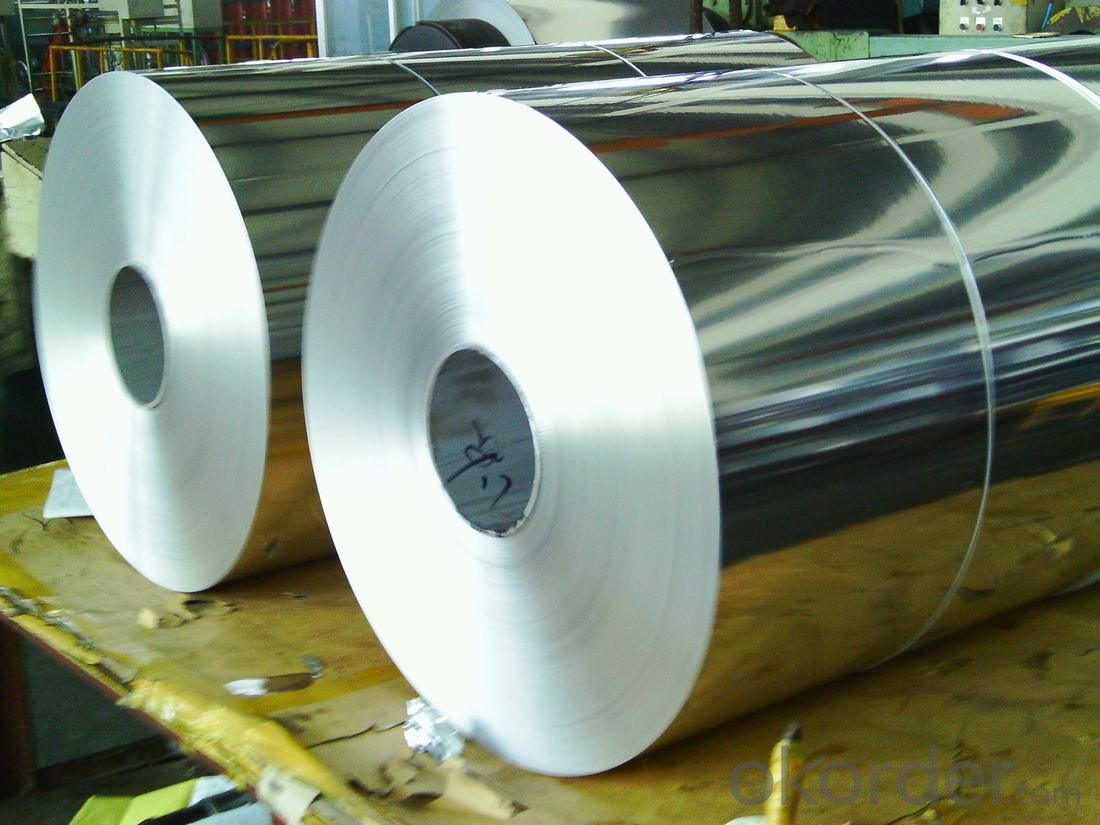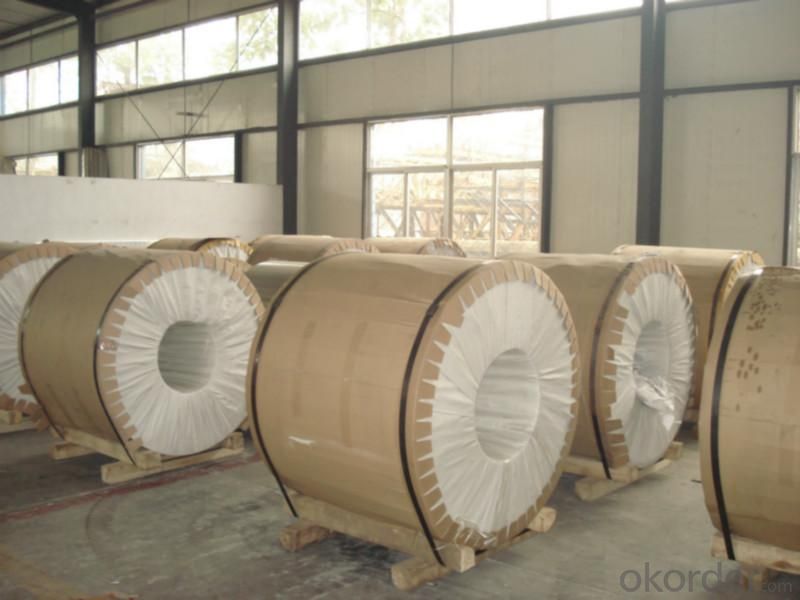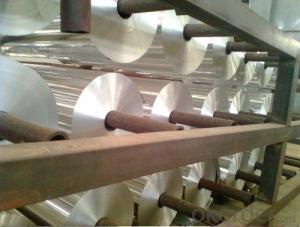ASTM Grade 1100 Aluminum Strips Belt For Solar
- Loading Port:
- Shanghai
- Payment Terms:
- TT OR LC
- Min Order Qty:
- 5 m.t.
- Supply Capability:
- 500 m.t./month
OKorder Service Pledge
OKorder Financial Service
You Might Also Like
Item specifice
ASTM Grade 1100 Aluminum Strips Belt For Solar
aluminum coil specifications:
1) Alloy :1050, 1060,1100, 3003 3004 3105 3A21 5005 5052 etc
2) Temper: O/H12/H14/H1/H18/H32/H34/H36/H38//H111/H112/H116/H321/T6/T651/T3/T351 etc
3) Thickness: 0.1mm to 6mm
4) Width:20mm to 3300mm
5)Coil weight: 100kgs to 6 tons depends on actual requirement
6)Core material: Aluminum or paper
7)Coil Inner diameter: 75mm, 150mm, 200mm, 300mm, 405mm, 505mm or as required
8) Protective film can be added
item | 3003 Aluminum coil | |
Standard | GB/T3190-2008,GB/T3880-2006,ASTM B209,JIS H4000-2006,etc | |
Material | 1060,1050,1100 3003,3103,3004,3005,3105 5052, 5454,5754 | |
Size | Thickness | 0.5mm-3.5mm |
Width | 800-1500mm | |
Weight/Roll | About 1.5MT/3MT | |
Quality control | Mill Test Certificate is supplied with shipment, Third Part Inspection is acceptable. | |
Surface | Bright, polished, hair line, brush, checkered, embossed, etc | |
Trade terms | Price term | ,FOB, CNF, CIF, etc |
Payment Term | TT,L/C | |
MOQ | 2MT | |
20 GP Capacity | About 20-25MT | |
Delivery time | 1.The products will delivery immediately after receiving the payment. 2.According to the order quantity, prompt delivery. | |
Export to | Ireland,Singapore,Indonesia,Ukraine,Spain,Canada,USA,Brazil,Thailand,Korea,Iran,India,Egypt,Kuwait, Oman,Viet Nam, South Africa, Dubai, Russia, etc | |
Package | Stick blue film→plastic film→waterproof paper→1~2 tons on a export standard pallet(corner protection) | |
Application | 1)Further making utensil.2)Solar reflective film3)The appearance of the building4)Interior decorating:ceilings,walls,etc.5)Furniture cabinets6)Elevator decoraction7)Signs,nameplate,bags making.8)Decoration inside and outside the car9)Household appliances:refrigerators,microwave ovens,audio equipment,etc.10)The consumer electronics:mobile phones,digital cameras,MP3,etc. | |



- Q:I think the use of aluminum, at the lower levels, has really hurt US born players. To give a kid a piece of metal, and expect him to use wood when drafted........ I think US should go back to wood, whatever the costs (I know the aluminum is far cheaper). Thoughts....Cheers.
- You nailed it my friend. Aluminum has given our players a false sense of themselves and what they think they can do as a hitter. At the same time it is ruining the young pitchers when it comes to confidence. I have thought for years that it's destroying the game from within. Wood has always been the way to go. I would much rather hear the crack of the bat instead of the ping of the bat any day. Finally let's not forget the danger of aluminum bats. A line drive back to the mound comes off metal a lot faster than with wood. Pitchers are in harms way every time they throw a pitch!
- Q:How are aluminum coils priced in the market?
- Aluminum coils are typically priced in the market based on factors such as the current market demand and supply, the cost of raw materials, production and manufacturing costs, transportation costs, and any additional factors that may affect the overall pricing.
- Q:Are there any limitations to the maximum coil diameter of aluminum coils?
- Yes, there are limitations to the maximum coil diameter of aluminum coils. The maximum coil diameter is determined by several factors including the type and thickness of the aluminum, the equipment used for coiling, and the intended application of the coil. Generally, larger coil diameters can be achieved with thinner and more ductile aluminum alloys. However, as the coil diameter increases, it becomes more challenging to maintain the structural integrity of the coil and prevent deformation, wrinkling, or damage during handling and transportation. Additionally, the equipment used for coiling may have limitations in terms of the maximum diameter it can handle. Therefore, it is important to consider these factors when determining the maximum coil diameter for aluminum coils.
- Q:How are aluminum coils different from steel coils?
- Aluminum coils differ from steel coils in terms of their material composition, weight, corrosion resistance, and conductivity. Aluminum coils are made of aluminum, while steel coils are made of steel. Aluminum is a lighter metal compared to steel, making aluminum coils lighter in weight. Moreover, aluminum coils have higher corrosion resistance due to the formation of a protective oxide layer on the surface. In terms of conductivity, aluminum coils have higher electrical conductivity compared to steel coils.
- Q:What are the common sizes of aluminum coils used in roofing?
- The common sizes of aluminum coils used in roofing typically range from 24 to 48 inches in width and come in various lengths, ranging from 50 to 100 feet.
- Q:What are the different packaging options for aluminum coils?
- There are various packaging options available for aluminum coils to ensure their safety and convenience during transportation and storage. Some common packaging options include: 1. Wooden Crates: Aluminum coils are often packaged in wooden crates, which provide excellent protection against impacts and ensure the coils remain intact during transit. The crates are typically reinforced with steel bands for added strength and stability. 2. Cardboard Boxes: Smaller aluminum coils or coils intended for retail purposes are often packaged in cardboard boxes. These boxes are lightweight, cost-effective, and provide moderate protection against minor impacts. 3. Plastic Wrapping: Aluminum coils can also be wrapped in plastic film, which helps protect them from moisture, dust, and scratches. This packaging option is commonly used for coils that are transported in bulk or in situations where additional packaging is not required. 4. Metal or Composite Tubes: In some cases, aluminum coils are packaged in metal or composite tubes. These tubes are sturdy and provide excellent protection against external forces. They are often used for coils with large diameters or longer lengths. 5. Customized Packaging: Depending on the specific requirements of the customer or industry, customized packaging options can be designed. This may include the use of foam or cushioning materials to provide additional protection, or the incorporation of specialized features such as moisture-resistant barriers. It is important to choose packaging options that best suit the specific needs of the aluminum coils, considering factors such as coil size, weight, transportation conditions, and storage requirements.
- Q:Are there any limitations on the length of aluminum coils?
- The length of aluminum coils is indeed constrained by several practical factors. These factors include transportation, handling, and manufacturing capabilities. Transportation presents a significant limitation, as longer coils can be challenging to move efficiently. Loading, unloading, shipping, and logistics become more difficult due to the size and weight of these coils. Specialized equipment may be necessary, which can increase costs and complexity. Handling is another constraint, as longer coils are harder to maneuver and manipulate during production. Larger and more robust machinery may be required, which may not be available or feasible in all manufacturing facilities. Manufacturing capabilities also impose restrictions on coil length. Equipment used for coil production may have size and capacity limitations. Coil processing lines and machinery may have maximum lengths they can handle, and exceeding these limits may not be possible or economically viable. In conclusion, while there is no universal limit on aluminum coil length, practical constraints in transportation, handling, and manufacturing can impose limitations. The specific length of aluminum coils depends on factors such as transportation capabilities, handling feasibility, and manufacturing processes.
- Q:Can aluminum coils be used for signage and display applications?
- Yes, aluminum coils can be used for signage and display applications. Aluminum is a versatile material that is lightweight, durable, and resistant to corrosion, making it an ideal choice for various signage and display purposes. Its flexibility allows for easy shaping and customization, while its smooth surface provides a perfect canvas for printing graphics and designs. Additionally, aluminum coils can be easily mounted, making them suitable for both indoor and outdoor signage and displays.
- Q:What is the maximum coil weight that can be produced?
- Several factors, including the type of material being coiled, the size and capacity of the coiling equipment, and the strength and durability of the coil itself, determine the maximum weight of a coil that can be produced. Generally, the maximum weight of a coil can vary from a few pounds to several tons. However, it is important to consider that exceeding the recommended maximum weight of a coil can result in safety hazards, equipment damage, and compromise the quality and integrity of the coil. Therefore, it is crucial to refer to the manufacturer's guidelines and specifications to ascertain the maximum weight of a coil that can be safely and effectively produced for a specific application.
- Q:What is the thermal conductivity of aluminum coils?
- The thermal conductivity of aluminum coils is high, making them efficient in transferring heat.
1. Manufacturer Overview |
|
|---|---|
| Location | |
| Year Established | |
| Annual Output Value | |
| Main Markets | |
| Company Certifications | |
2. Manufacturer Certificates |
|
|---|---|
| a) Certification Name | |
| Range | |
| Reference | |
| Validity Period | |
3. Manufacturer Capability |
|
|---|---|
| a)Trade Capacity | |
| Nearest Port | |
| Export Percentage | |
| No.of Employees in Trade Department | |
| Language Spoken: | |
| b)Factory Information | |
| Factory Size: | |
| No. of Production Lines | |
| Contract Manufacturing | |
| Product Price Range | |
Send your message to us
ASTM Grade 1100 Aluminum Strips Belt For Solar
- Loading Port:
- Shanghai
- Payment Terms:
- TT OR LC
- Min Order Qty:
- 5 m.t.
- Supply Capability:
- 500 m.t./month
OKorder Service Pledge
OKorder Financial Service
Similar products
New products
Hot products
Hot Searches
Related keywords



























